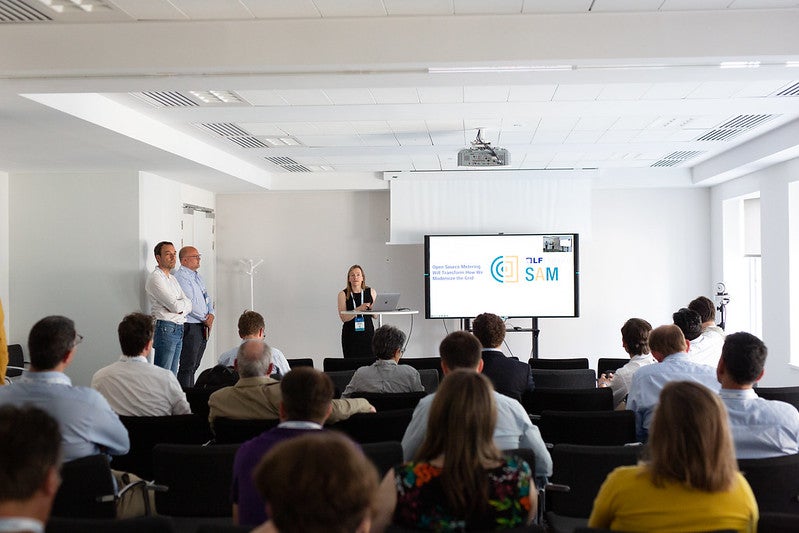LF Energy Summit 2023 Recap: Open Source Metering’s Role in Revolutionizing Grid Modernization
In the ever-evolving landscape of energy consumption and distribution, the need for innovative solutions is more critical than ever. LF Energy Summit 2023 brought together industry experts to shed light on a game-changing concept: open source metering. During a panel session titled “Open Source Metering Will Transform How We Modernize the Grid,” Marissa Hammond from Utilidata, Laurent Van Groningen from Alliander, and Marcel Neu from Stedin delved into the transformative potential of open source metering and its implications for grid modernization (video follows below).
Embracing Open Source for Grid Evolution
At the heart of the discussion was the concept of open source metering. The speakers introduced the Super Advanced Meter (SAM) project, a collaborative effort to establish open source standards for both hardware and software architecture of meters. This initiative is poised to reshape the industry by fostering innovation, flexibility, and interoperability.
Challenges Prompting Change
The urgency of adopting open source metering stems from the rapidly changing energy landscape. With the accelerating electrification of heating, transportation, and the proliferation of charging stations, the grid’s traditional functions are being stretched to the limit. Traditional metering systems struggle to keep up with the demand for real-time data, hindering optimization and adaptation.
Three Pillars of Transformation
The panelists highlighted three key pillars driving the need for open source metering:
- Grid Optimization: Open source metering addresses the challenge of optimizing the grid. By deploying advanced meters capable of real-time data acquisition, decision-making, and control, utilities gain a more accurate understanding of grid status. This data-driven approach enables dynamic grid management, reducing inefficiencies and enhancing reliability.
- Energy Consumption Management: The rise in electrification places new demands on the grid. As more consumers adopt electric vehicles and heat pumps, energy consumption patterns shift dramatically. Open source metering empowers utilities to monitor and manage this increased load effectively, preventing overloads and outages.
- Market Adaptability and Innovation: The panelists stressed the importance of a standardized, open source architecture that adapts to diverse markets and preferences. Rather than being locked into proprietary systems, utilities can leverage a universal, open platform that accommodates various billing practices, privacy regulations, and customer preferences. This empowers both utilities and consumers by fostering competition and innovation.
Elevating Grid Operations
Open source metering introduces the concept of “edge processing,” which brings computational capabilities closer to the source of data generation. This approach enables more sophisticated data analysis, faster decision-making, and the deployment of energy-efficient algorithms. By embracing edge processing, the grid can respond to dynamic changes with greater agility, ensuring stability and optimal energy distribution.
Overcoming Challenges through Collaboration
The panelists acknowledged challenges in the adoption of open source metering, such as concerns about security, energy efficiency, and the transition from proprietary systems. However, they emphasized the benefits of collaboration and the collective wisdom of the open source community. By inviting contributions from a diverse pool of experts, open source projects can benefit from rapid innovation, enhanced security through peer review, and cost-effective development.
Towards a Brighter Energy Future
In conclusion, the panelists conveyed their excitement about the transformative potential of open source metering. The initiative’s impact extends beyond traditional energy management to reshape how utilities, consumers, and markets interact with the grid. Open source metering promises to unlock new possibilities, from optimized grid operations and adaptive energy consumption management to enhanced privacy controls and groundbreaking applications.
